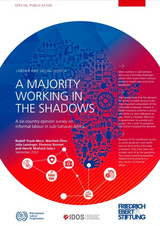Externe Publikationen

Trust in institutions and perceptions of the tax system among informally employed people
von Schiller, ArminExterne Publikationen (2022)
in: Traub-Merz, Rudolf / Manfred Öhm / Julia Leininger / Florence Bonnet / Henrik Maihack (Hrsg.), A majority working in the shadows: A six country opinion survey on informal labour in sub-Saharan Africa, Berlin: Friedrich-Ebert-Stiftung , 49-57
ISBN: 978-3-9862814-3-4
Volltext/Full text
The challenge to develop more comprehensive health and social protection systems is not just technical in nature. Agreeing and implementing the necessary reforms to make this widely shared goal a reality requires acknowledging and potentially reshaping citizens’ vertical relations with the state and also the horizontal relationships between citizens. As a result, any strategy to expand the health and social protection systems requires thinking carefully about how the relationship between the informally employed and state institutions is perceived and defined. In addition, the fiscal dimension of the reform is undoubtedly crucial. Finding the scope for a reform that is politically, socially and fiscally sound requires changes in the predominant fiscal contracts, understood as an implicit agreement in a society defining how much members can expect to benefit from state action and how much they are expected to contribute in exchange. In this chapter. the results of surveys among the informally employed in six African countries are presented. The responses offers crucial indications to approach the challenges sketched above. Health is defined as the top priority that informally employed people would like governments to focus on. Generally speaking, informally employed are open to contribute more via taxes and fees if they themselves or even poorer people obtain better services in exchange. The vast majority also expresses support for a vision of the state that targets services at the poor, regardless of whether they are able to contribute to the fiscal effort. One major obstacle to coordinating and implementing more ambitious reforms seems to be lack of trust among informally employed in various social and political institutions, especially so-called intermediary institutions, such as political parties and trade unions. Overall, there seems to be scope for reform but much work is needed to create the socio-political conditions required for the vision to be feasible.
Kontakt
Cornelia Hornschild
Koordinatorin Publikationen
E-Mail Cornelia.Hornschild@idos-research.de
Telefon +49 (0)228 94927-135
Fax +49 (0)228 94927-130
Alexandra Fante
Bibliothekarin/Open Access-Koordinatorin
E-Mail Alexandra.Fante@idos-research.de
Telefon +49 (0)228 94927-321
Fax +49 (0)228 94927-130



